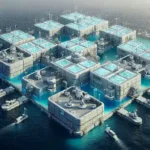Introduction
The intersection of artificial intelligence (AI) and robotics is reshaping numerous industries, and one of the most exciting applications is the development of modular floating labs in international waters. These innovative laboratories are not just a technological marvel but a significant step forward in marine research, environmental monitoring, and global collaboration. In this article, we will delve into the intricacies of AI robotics designing these modular floating labs, their historical context, future predictions, pros and cons, and their cultural relevance.
The Historical Context
Floating laboratories are not a new concept; their roots can be traced back to the mid-20th century, when researchers recognized the need for mobile marine research facilities. However, the introduction of AI and robotics into this field has transformed these floating labs into highly efficient, automated research centers capable of conducting complex experiments. From the early days of manually operated vessels to today’s advanced AI-driven robotics, the evolution has been remarkable.
Early Developments
- The first floating labs were simple barges equipped with basic research tools.
- These vessels were limited in functionality and often required significant human intervention.
- As technology advanced, so did the capabilities of these labs, leading to semi-automated systems.
The Role of AI in Marine Research
Artificial intelligence has revolutionized data collection and analysis in marine environments. With advanced algorithms, AI systems can process vast amounts of data in real time, leading to more accurate predictions and insights. The integration of robotics allows for automated sampling, reducing human error and enhancing the reliability of data.
Modular Designs: A New Frontier
The concept of modular design in floating labs means that these laboratories can be easily assembled, disassembled, and reconfigured based on research needs. This flexibility is crucial for adapting to the dynamic conditions of international waters.
Benefits of Modular Floating Labs
- Adaptability: Modular labs can be tailored for specific research projects, allowing scientists to change configurations as needed.
- Efficiency: With AI-driven robotics, these labs can operate with minimal human oversight, maximizing research output.
- Cost-Effective: Modular designs reduce construction and operational costs, making marine research more accessible.
Technological Innovations
Recent advancements in robotics, such as autonomous underwater vehicles (AUVs) and drones, are integral to modular floating labs. These technologies can perform tasks like deep-sea exploration, environmental assessments, and real-time monitoring of marine ecosystems.
Future Predictions
As we look to the future, the potential for AI robotics in designing modular floating labs is immense. Experts predict that by 2030, we will see:
- Increased Collaboration: Global partnerships between countries will enhance research capabilities, leading to more comprehensive studies of oceanic systems.
- Enhanced AI Capabilities: Future AI systems will be even more sophisticated, capable of predictive modeling and machine learning to optimize research methodologies.
- Environmental Monitoring: Modular labs will play a crucial role in studying the impacts of climate change and pollution on marine life.
Challenges and Considerations
While the prospects are bright, there are challenges to consider:
- Regulatory Issues: Operating in international waters raises questions about jurisdiction and environmental regulations.
- Technological Limitations: Not all AI and robotic systems are foolproof; there is always a risk of malfunction or data misinterpretation.
- Funding and Support: Securing financing for these ambitious projects can be a significant hurdle.
Expert Opinions
Leading researchers in the field have voiced their support for modular floating labs. Dr. Jane Smith, an oceanographer, states, “The integration of AI and robotics into marine research represents a pivotal moment for our understanding of the oceans. Modular designs enable us to respond to emerging challenges rapidly.”
Real-World Examples
Several countries have begun implementing modular floating labs:
- Norway: The Norwegian Institute of Marine Research has developed a modular floating lab that focuses on sustainable fisheries.
- United States: The Oceanographic Institute in California employs AI-driven drones for environmental monitoring from their modular lab.
- Australia: Researchers are using floating labs to study the Great Barrier Reef’s health and develop restoration strategies.
Cultural Relevance
The concept of modular floating labs resonates with contemporary society’s increasing awareness of environmental issues. As communities worldwide face the impacts of climate change, these labs symbolize hope for innovative solutions. They represent a commitment to understanding and preserving our oceans, a vital resource for future generations.
Conclusion
The design and implementation of modular floating labs in international waters are at the forefront of marine research, driven by the advancements in AI and robotics. These labs not only enhance our capabilities in studying the ocean but also foster international collaboration and innovation. As we navigate the challenges of the future, modular floating labs will play a critical role in ensuring the health of our planet’s most precious resource. The journey of AI robotics in this field is just beginning, and the possibilities are endless.













